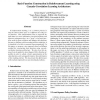Free Online Productivity Tools
i2Speak
i2Symbol
i2OCR
iTex2Img
iWeb2Print
iWeb2Shot
i2Type
iPdf2Split
iPdf2Merge
i2Bopomofo
i2Arabic
i2Style
i2Image
i2PDF
iLatex2Rtf
Sci2ools
117
click to vote
ICMLA
2008
2008
Basis Function Construction in Reinforcement Learning Using Cascade-Correlation Learning Architecture
In reinforcement learning, it is a common practice to map the state(-action) space to a different one using basis functions. This transformation aims to represent the input data in a more informative form that facilitates and improves subsequent steps. As a "good" set of basis functions result in better solutions and defining such functions becomes a challenge with increasing problem complexity, it is beneficial to be able to generate them automatically. In this paper, we propose a new approach based on Bellman residual for constructing basis functions using cascadecorrelation learning architecture. We show how this approach can be applied to Least Squares Policy Iteration algorithm in order to obtain a better approximation of the value function, and consequently improve the performance of the resulting policies. We also present the effectiveness of the method empirically on some benchmark problems.
Basis Functions | Cascadecorrelation Learning Architecture | ICMLA 2008 | Least Squares Policy | Machine Learning |
Related Content
| Added | 29 Oct 2010 |
| Updated | 29 Oct 2010 |
| Type | Conference |
| Year | 2008 |
| Where | ICMLA |
| Authors | Sertan Girgin, Philippe Preux |
Comments (0)

